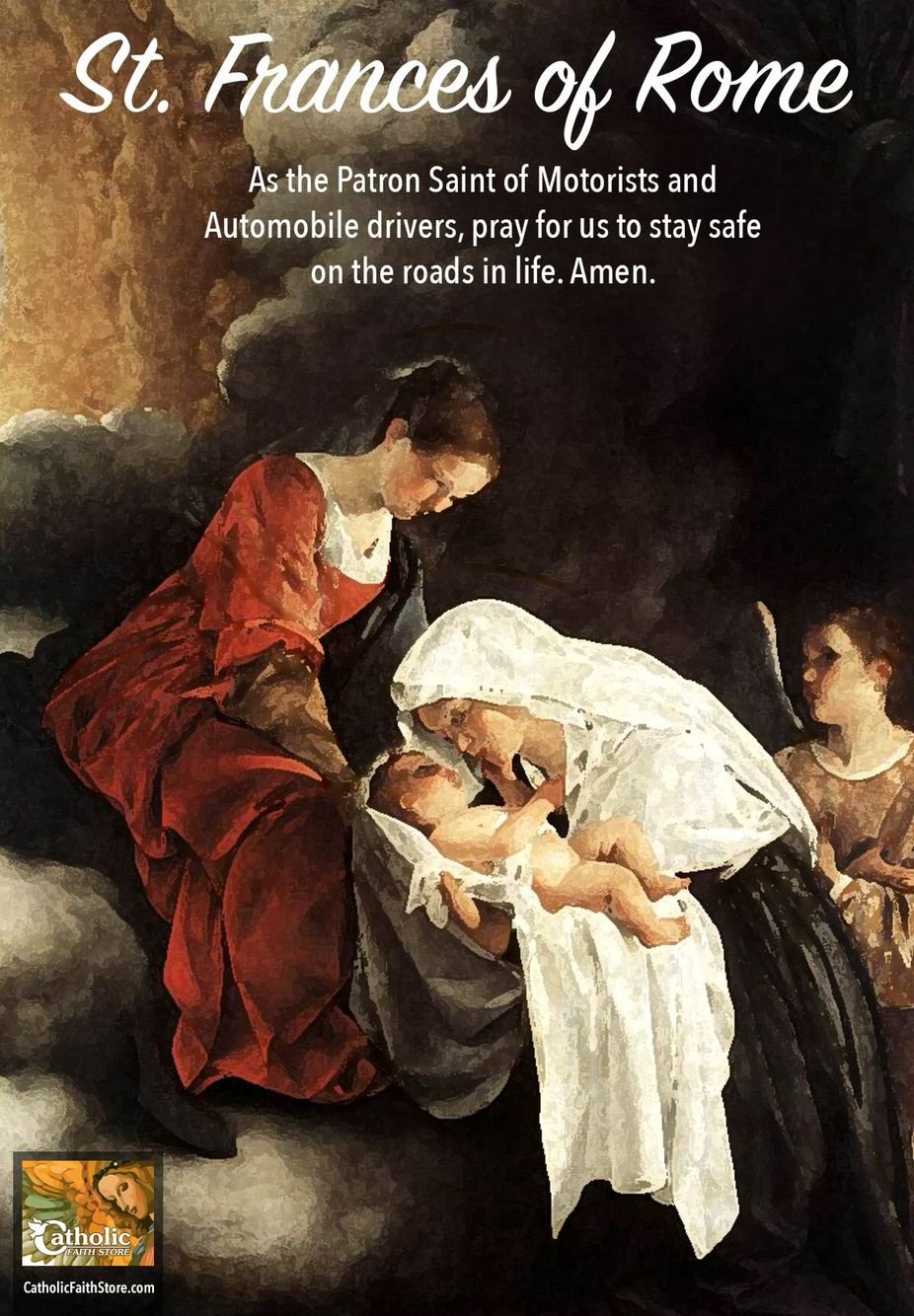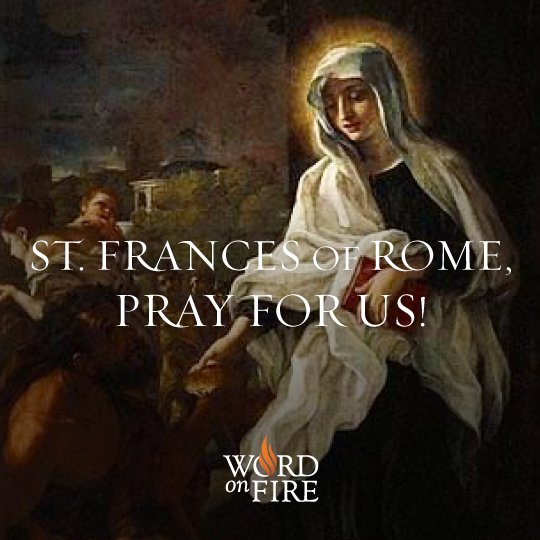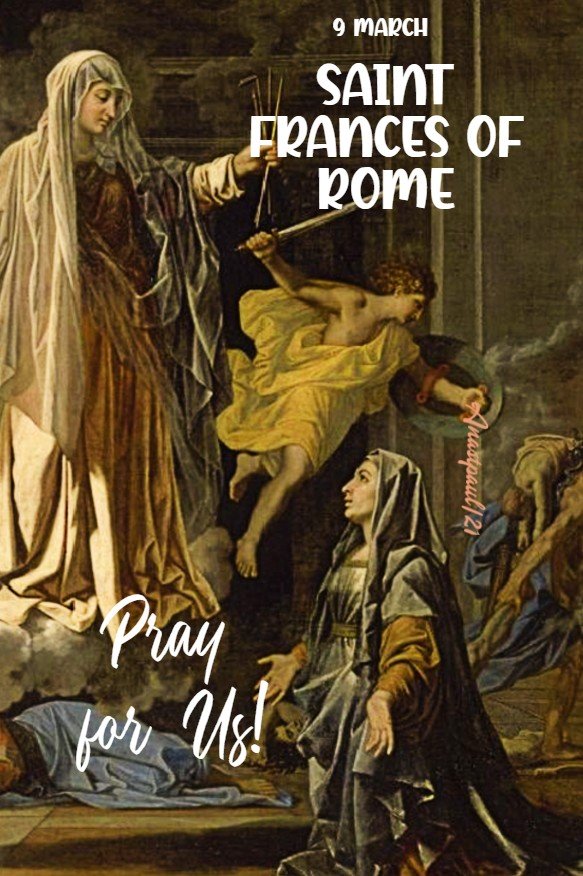
Proverbs 31:20
March 8, 2022
1 John 3:18
March 9, 2022FEAST OF SAINT FRANCES OF ROME
FEAST DAY – 9th MARCH
Frances of Rome, (1384 – March 9, 1440) is an Italian saint who was wife, mother, mystic, organizer of charitable services and a Benedictine oblate who founded a religious community of oblates, who share a common life without religious vows. She was born in the city of Rome to a wealthy, noble family. From her mother she inherited a quiet manner and a pious devotion to God. From her father, she inherited a strong will. She decided at eleven that she was going to be a nun, but her father had already promised her in marriage to the son of a wealthy family.
In Rome at that time a father’s word was law. A father could even sell his children into slavery or order them killed. But just as he wouldn’t listen to her, Frances wouldn’t listen to him. She stubbornly prayed to God to prevent the marriage until her confessor pointed out that she was opposing God’s Will. She gave in to the marriage reluctantly. It was difficult for people to understand her objection.
Her future husband Lorenzo Ponziani was noble, wealthy, a good person and he really cared for her. An ideal match, except for someone who wanted only to be a bride of Christ. Then her nightmare began. This quiet, shy thirteen year old was thrust into the whirl of parties and banquets that accompanied a wedding. Her mother-in-law Cecilia loved to entertain and expected her new daughter-in-law to enjoy social life too.
Fasting and scourging were far easier than this torture God now asked her to face. Frances collapsed from the strain. For months she lay close to death, unable to eat or move or speak. At her worst, she had a vision of St. Alexis. The son of a noble family, Alexis had run away to beg rather than marry and when he returned home his own father thought he was just another beggar. St. Alexis told her God was giving her an important choice and she accepted God’s Will. This set her on the road to sanctity. St. Alexis told her to live to glorify God’s Name.
Her recovery was immediate and complete. Lorenzo became even more devoted to her, and in awe of what she’d been through. But her problems did not disappear. Her mother-in-law expected her to entertain and go on visits with her. Looking at Frances’ sister-in-law Vannozza happily going through the rounds of parties, playing cards, she questioned why Frances couldn’t be more like her. In a house where she lived with her husband, his parents, brother and brother’s family, she felt all alone.
And that’s why Vannozza found her crying bitterly in the garden one day. When Frances poured out her heart to Vannozza, it turned out that this sister-in-law had wanted to live a life devoted to the Lord too. What Frances had written off as frivolity was just Vannozza’s natural easy-going and joyful manner. They became close friends and worked out a program of devout practices and services to work together.
They decided their obligations to their family came first. For Frances that meant dressing up to her rank, making visits and receiving visits, and most importantly, doing it gladly. But the two spiritual friends went to mass together, visited prisons, served in hospitals and set up a secret chapel in an abandoned tower of their palace where they prayed together. It wasn’t fashionable for noblewomen to help the poor and people gossiped about them being alone on the streets.

Cecilia, suffering under the laughter of her friends, scolded her daughters-in-law to stop their spiritual practices. When that didn’t work Cecilia then appealed to her sons, but Lorenzo refused to interfere with Frances’ charity. The start of the fifteenth century brought the birth of her first son, Battista, after John the Baptist. We might expect that the grief of losing her mother-in-law soon after might have been mixed with relief, with no more pressure to live in society. But a household as large as the Ponziani’s needed someone to run it.
She was thrust even more deeply into society and worldly duties. She was an excellent administrator and a fair and pleasant employer. After two more children were born to her, a boy, Giovanni Evangelista, and a girl, Agnes, a flood brought disease and famine to Rome. Frances gave orders that no one asking for alms would be turned away and she and Vannozza went out to the poor with corn, wine, oil and clothing.
Her father-in-law, furious that she was giving away their supplies during a famine, took the keys of the granary and wine cellar away from her, selling off their extra corn, leaving just enough for the family, and all but one cask of one. The two women went out to the streets to beg. Finally Frances was so desperate for food to give to the poor she went to the empty corn loft, sifting through the straw for kernels of corn. After she left Lorenzo came in and was stunned to find the empty granary filled with corn.
Frances drew wine out of their one cask until one day her father in law went down and found it empty. Everyone screamed at Frances. After saying a prayer, she led them to the cellar, turned the spigot on the empty cask, and out flowed the most wonderful wine. These incidents completely converted Lorenzo and her father-in-law completely to her side. She immediately sold her jewels and clothes and distributed the money, wearing a dress of coarse green cloth.
Civil war came to Rome and this was a time of popes and antipopes and Rome became a battleground. At one point there were three men claiming to be pope. One of them sent a cruel governor, Count Troja, to conquer Rome. Lorenzo was seriously wounded and his brother was arrested. Troja sent word that Lorenzo’s brother would be executed unless he had Battista, Frances’s son and heir of the family, as a hostage.
When Frances heard this she grabbed Battista by the hand and fled. On the street, she ran into her spiritual adviser Don Andrew who told her she was choosing the wrong way and ordered her to trust God. She made her way to Capitol Hill where Count Troja was waiting. As she and Battista walked the streets, crowds of people tried to block her way or grab Battista from her to save him. After giving him up, Frances ran to a church to weep and pray.
As soon as she left, Troja had put Battista on a soldier’s horse – but every horse they tried refused to move. Finally the governor gave in to God’s wishes. Frances was still kneeling before the altar when she felt Battista’s little arms around her. But the troubles were not over. Frances was left alone against the attackers when she sent Lorenzo out of Rome to avoid capture. Drunken invaders broke into her house, tortured and killed the servants, demolished the palace, and literally tore it apart.
Battista was taken to Naples. Yet this kidnapping saved his life, because soon a plague hit that took the lives of many including Frances’ nine-year-old son Evangelista. At this point, her house in ruins, her husband gone, one son dead, one son a hostage, she could have given up, but clearing out the wreckage of the house she turned it into a makeshift hospital and a shelter for the homeless.
One year after his death Evangelista came to her in a vision and told her that Agnes was going to die too. In return God was granting her a special grace by sending an archangel to be her guardian angel for the rest of her life. She would always be able to see him. A constant companion and spiritual adviser, he once commanded her to stop her severe penances (eating only bread and water and wearing a hair shirt).

Finally the wars were over and Battista and her husband returned home. But though her son came back a charming young man her husband returned broken in mind and body. Probably the hardest work of healing Frances had to do in her life was to restore Lorenzo back to his old self. When Battista married a pretty young woman named Mabilia, Frances expected to find someone to share in the management of the household.
But Mabilia wanted none of it. She was as opposite of Frances as Frances had been of her mother-in- law. Mabilia wanted to party and ridiculed Frances in public for her shabby green dress, her habits, and her standards. One day in the middle of yelling at her, Mabilia suddenly turned pale and fainted, crying, “Oh my pride, my dreadful pride.” Frances nursed her back to health and healed their differences. A converted Mabilia did her best to imitate Frances after that.
On August 15, 1425, the feast of the Assumption of Mary, she founded the Olivetan Oblates of Mary, a confraternity of pious women. In March 1433, she founded a monastery at Tor de’ Specchi, near the Campidoglio, to allow for a common life by those members of the confraternity who felt so-called. Frances remained in her own home, nursing her husband for the last seven years of his life from wounds he had received in battle. When he died in 1436, she moved into the monastery and became the superior. She died in 1440 and was buried in Santa Maria Nova.
On May 9, 1608, she was canonized by Pope Paul V, and in the following decades a search was made for her remains, which had been hidden and her body was found incorrupt. Her grave was identified on April 2, 1638, and her remains, now bones, was reburied in the Church of Santa Maria Nova on March 9, 1649, which since then has been her feast day. Since 1869, her remains have been kept in a glass casket for veneration.
In 1925, Pope Pius XI declared her the patron saint of automobile drivers because of a legend that an angel used to light the road before her with a lantern when she traveled, keeping her safe from hazards. Within the Benedictine Order, she is honored as a patron saint of all oblates. She is also a patron saint of widows.
PRAYER
Dear Lord, we thank You for giving us St. Frances of Rome as an example of holiness. Help us to imitate the love of You she showed by choosing to follow Your will for her life over her own. We ask this in Jesus’ Name. Amen

St. Frances of Rome, pray for us.




